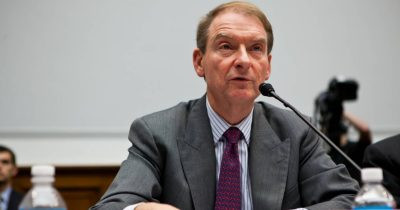President-elect Donald Trump has nominated Paul Atkins, a former commissioner of the Securities and Exchange Commission (SEC), to lead the agency, a move that reflects his administration’s pro-crypto stance. Sources indicate that while Trump awaits Atkins’ acceptance of the nomination, the decision carries significant implications for the future of cryptocurrency regulation in the United States. If Atkins declines, Trump will need to consider alternative candidates. Acceptance of the role would lead to a vetting process in the Senate, where Atkins’ prior track record may influence his potential confirmation.
Atkins, who served on the SEC during the administration of President George W. Bush, has been an outspoken supporter of the cryptocurrency industry in recent years. Since leaving the SEC in 2008, he has engaged with the crypto community through his work as co-chair of the Token Alliance at the Digital Chamber of Commerce. Furthermore, he advises various digital finance firms on compliance and regulatory issues through his own consultancy, Potomak Global Partners. His deep involvement in the sector positions him uniquely as a candidate who understands both regulatory perspectives and the needs of the cryptocurrency market.
Academics and former SEC colleagues have expressed respect for Atkins’ unique approach to his role. J.W. Verret, a professor at George Mason University, noted that Atkins was the first true libertarian to serve on the SEC, which set a precedent for a different governance style at the agency. John Reed Stark, a former SEC staff member, praised Atkins for his leadership and relationship with SEC staff. This positive feedback suggests that if confirmed, Atkins might foster a workplace environment that is collaborative and innovative, potentially altering the SEC’s approach toward crypto regulation.
Under the current leadership of Gary Gensler, the SEC has intensively pursued regulatory enforcement actions against cryptocurrency firms, often citing violations related to unregistered securities offerings and fraud. If Atkins takes over as chair, observers expect a shift towards a more lenient and pro-innovation stance, which could pave the way for an evolving regulatory landscape conducive to cryptocurrency development. This change could encourage the growth of the digital asset industry, which has been grappling with regulatory uncertainty under Gensler.
Trump’s administration has shown clear intent to engage with the cryptocurrency sector, as evidenced by his commitment to forming a “Crypto Advisory Council” aimed at crafting forward-thinking crypto policy. Additionally, his proposal for a “Strategic Bitcoin Reserve” demonstrates an innovative approach to managing government-seized digital assets. In tandem with Atkins’ nomination, Trump has appointed other key figures with pro-crypto perspectives, including Scott Bessent as Treasury Secretary and Howard Lutnick for Commerce Secretary, which reflects a broader commitment to reshaping US financial policy considering the growing significance of cryptocurrencies.
As the nomination awaits final confirmation, political bettors on Kalshi have expressed a strong belief—85% likelihood—that Atkins will assume the role of SEC chair. This statistic underscores the anticipation surrounding his nomination not only within a segment of the financial community but also among those advocating for a more favorable regulatory environment for cryptocurrencies. The convergence of political and industry interests could yield transformative changes for the evolving crypto landscape, particularly if Atkins’ leadership embodies a paradigm shift towards more supportive approaches in digital finance regulation.


